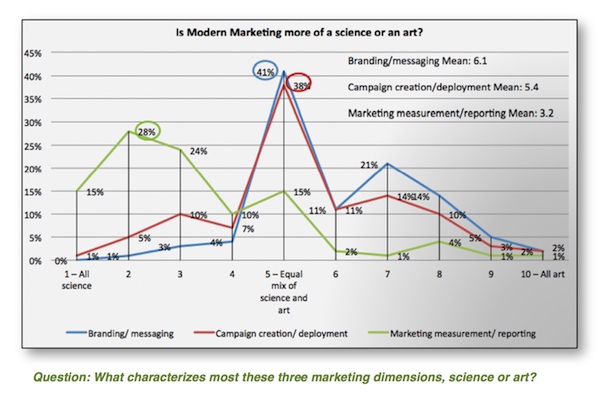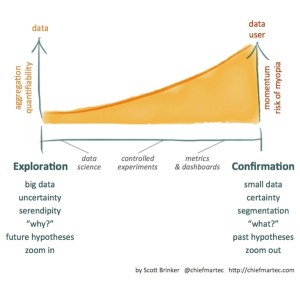
I’m fascinated by this chart that was included in a recent report by Eloqua and BtoB Magazine, Defining the Modern Marketer: From Ideal to Real. Based on a survey of 556 B2B marketing professionals from companies of all sizes and industries, the report reveals current perceptions about what “modern marketing” is today — and should be tomorrow.
At first glance, the tall blue and red peaks in the middle pop out, showing that the largest percentage of marketers believe that modern marketing is an equal blend of science and art. As both a humanist and a technologist — I know, strange mix — I smile because I do believe such a balanced and integrated worldview is the basis of modern marketing.
The blue line represents where marketers felt branding and messaging fell along that science vs. art continuum. The red line represents their assessment of that for campaign creation and deployment.
But then there’s the green line.
The green line represents how those same marketers characterize marketing measurement and reporting, which is heavily right-skewed towards the science end of the spectrum. To quote the report: “Marketers are strongly of the opinion that science rules metrics, with the intuitive marketing qualities playing little part.”
In some ways, that feels intuitively natural. Branding, messaging, and campaigns are predominantly about creation, while metrics and reporting are predominantly about analysis. Those are qualitatively different activities, right?
But let’s probe a bit on how we think they’re different. Metrics use numbers? Creative uses words, images, concepts? Analysis is left-brain, creative is right-brain? Of course, modern marketers use analysis to inform creative — which presumedly is why the red and blue lines peak in the middle. Is the green line just a component of the other two activities, their left half? The science half? The distinctions start to get fuzzy.
Which leads me to the question: what do we mean by “science?”
Science is more than math, less than magic
I’m not proposing a deep philosophical debate, but I do want to examine the expectations and assumptions behind “marketing as a science” because they affect what we do and how we think about it.
Do marketers equate scientific marketing with quantitative measurement? True, science cares deeply about accurate measurement of empirical evidence. But for most scientists, measurement is simply a means to an end — a mechanism for determining if a particular experiment gives evidence for or against a hypothesis. The scientific method, what I would argue is the heart of science, is about a much broader process of discovery. That pursuit of discovery is a spectacularly creative endeavor.
Just counting the numbers isn’t science, it’s bookkeeping.
More concerning, however, is when “science” in marketing is interpreted as formulaically predictable phenomena, like physics equations for customer creation. I’ve already argued why that isn’t so at the beginning of my article on the big data bubble in marketing, so I won’t rehash that here. The short version is: human psychology and behavior — and organizations and markets that entwine many humans together in complex ways — defy being boiled down into a set of deterministic algorithms.
It’s common sense. If you had a machine that could perfectly predict human behavior, why waste your time doing marketing? Just point it at the stock market and become the world’s first trillionaire. Or systematically achieve world peace, if you’re feeling more charitable.
That’s not to say that computational marketing, or algorithmic marketing as some call it, isn’t valuable. It can be. But its scope is usually quite limited to specific scenarios — for instance, retargeting in display advertising, where you’re really just seeking a probabilistic edge in your guess about which ad will work better for a particular prospect on a particular page at a particular moment in time. Hey, a probabilistic edge in display advertising is nothing to sneeze at. It makes a difference in your marketing ROI.
But problems arise if you develop delusions of grandeur believing that such probabilistic improvements imply actual knowledge of customer thinking. The models used in these computations are not reality — at best, they’re highly simplified approximations within a narrow context. If you overreach and venerate them as a magic black box of customer creation, you will be disappointed (and probably out of a job).
4 principles of good marketing science
So if science in marketing is more than math — but less than magic — what exactly is it?
Ironically, the answer to such a question is inherently subjective, as marketing isn’t a well-defined science, much less a “hard” science with objective natural laws. But the metaphor is useful in driving management and culture. So with that caveat, here are what I believe are the 4 principles of good marketing science:
1. Marketing as a science is about objectively using data to support decision making. It’s about understanding how to interpret data — and how to identify common errors or misrepresentations in interpretations. It’s also about critically questioning data, its source, its quality, the context in which it was collected, and alternative interpretations that it supports. It’s not just taking pre-canned metrics as a given. It’s about recognizing what data is missing. It’s about trying as much as possible to minimize biases to make good judgments with imperfect information in an uncertain world.
2. Marketing as a science is about looking for patterns in the market and in customer behaviors — within data, but also through more qualitative sources of information, such as conversations with prospects, peers, and third-parties. This is where data science is applied in the exploration of marketing data. It’s about whittling those patterns into models and hypotheses that can be tested. It’s about figuring out ways to operationalize good responses to those patterns with a relative degree of precision. But it’s also about recognizing the probabilities and limitations of those patterns and being vigilant to changes over time and interaction effects with other events and activities. It’s about managing the complex system dynamics of marketing as best as possible.
3. Marketing as a science is about embracing ideas from other scientific and engineering disciplines: psychology, economics, computer science, neuroscience, biology, industrial engineering, anthropology, sociology, etc. It’s about translating the work of other scientists and engineers into the context of marketing, at least as an inspiration for new models and hypotheses. It’s about keeping an open mind to new theories, while also critically examining their reliability and relevance. It’s about a constant drive for new learning on the frontier of marketing thinking.
But most of all…
4. Marketing as a science is really about running good controlled experiments to test hypotheses. This is the heart of the scientific method applied to any discipline. It’s about designing good experiments. It’s about choosing meaningful hypotheses to test. It’s about minimizing confounding variables in such tests — while acknowledging that real-world marketing experiments are inevitably subject to uncontrolled influences. It’s about deciding how much formality should be applied to a marketing experiment. It’s about intellectual honesty in the analysis of outcomes, knowing the difference between proving something versus merely providing corroborating evidence. It’s about iterating experiments in a smart way to methodically make progress in the pursuit of a theory. It’s about knowing when to stop pursuing a theory. It’s about carefully considering the how outcome of an experiment can be generalized and expanded to other contexts — or not. It’s about assessing when to reuse the learning from a past experiment and when to revalidate it. It’s about advocating that the answer to many marketing management questions is: test it.
The common theme among all these principles? Science in marketing is the systematic quest for knowledge. Not absolute truth, but effective working knowledge that can be applied to growing a business.
What does marketing as a science mean to you?




